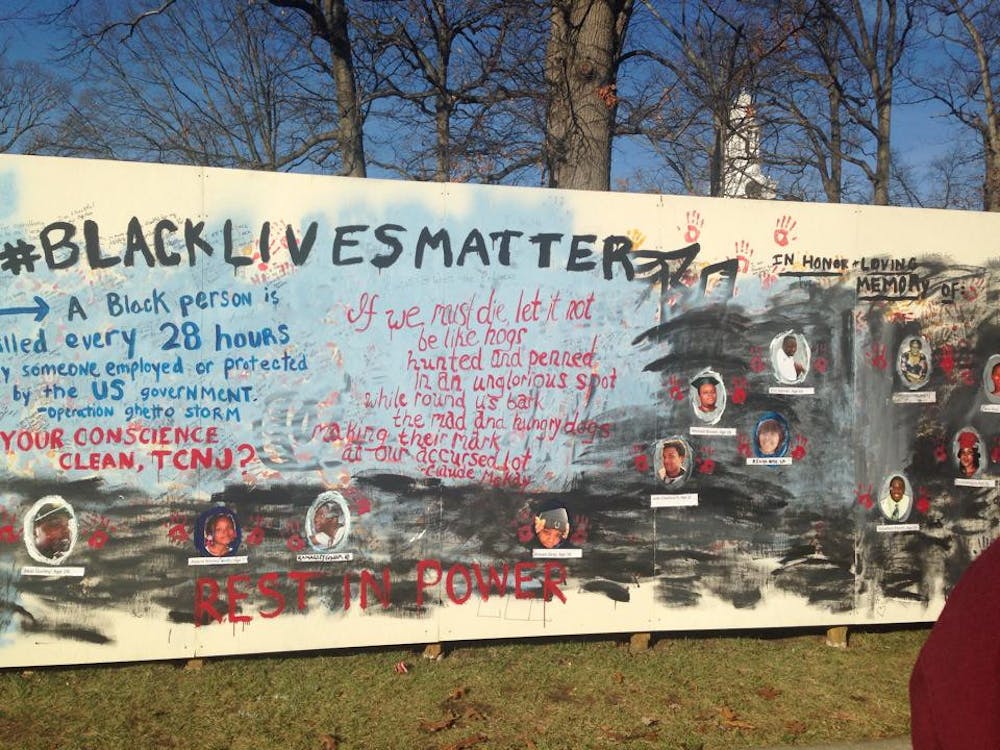By David Brown
Correspondent
Mirroring the sentiments of many individuals across the nation, the College’s “#BlackLivesStillMatter: A Panel Discussion” centered on the issues of police brutality toward blacks and how these occurrences gain fleeting popularity, then quickly fade on social media sites.

The panel, nestled in ABE’s Drawing Room, took place on Wednesday, April 14 and was hosted by Centennial Hall Community Advisors (CAs) senior English literature major Carly DaSilva and sophomore psychology major Ijal Thompson. The panel featured English and African-American studies Associate Professor Piper Kendrix Williams, African American studies and history Adjunct Professor David McAllister, Assistant Vice President for Student Affairs Sean Stallings and Black Student Union executive board members Madina Ouedraogo, a freshman sociology major, and Tatiyanna Mingo, a freshman psychology major.
The discussion began with Williams distributing a handout of writings she selected in order to illustrate the historical and contemporary treatment of black people through different eras, including slavery, Reconstruction and now. Her selections, which included the work of Henry Louis Gates, Ida B. Wells, Claudia Rankine and herself, set the tone for the panel.
Examining racial progress was a big focus for McAllister, who has now been a professor at the College for eight years. After reading a selection from “The Souls of Black Folk” by W. E. B. Du Bois, McAllister said he believes that the commonly held notion of racial progress is misleading.
“There are periods in American history when whites are concerned about black lives — the abolitionists, for example, Reconstruction politicians, the white public during the civil rights movement — but these periods of whites caring about black lives were only short-lived,” McAllister said.
His findings emphasize the purpose of the panel: to have people realize that binding an event to a hashtag often renders it temporary and forgettable in the eyes of the public. One recurring theme that continued to be shared by the entire panel is that the issue of police brutality toward blacks certainly isn’t temporary, and it isn’t just a black issue.
“People who care must continue to push the country into a full recognition that black lives matter,” McAllister said. “It will require concerted actions by blacks and whites, Asians and Latinos, indeed a subset of the whole country. Only this can push the rest of the country into requiring in reality what it proclaims in principle, that all men are created equal.”
Drawing on the concept of inclusivity, Stallings highlighted the need for people who care about these issues to first prove it
in their behavior, urging people to change the ways in which they interact with one another.
“We have to remember that all lives matter, but we have to carry ourselves in everything we do, in everything we say,” he said. “If you believe that black lives matter, that all lives matter, are you demonstrating that in the way you carry yourself?”
Carrying oneself in a manner indicative of being aware of those around you, as well as your own behavior, reigns true for Mingo.
“The hashtag is important, but I feel like people should already have this awareness and knowledge that black lives do matter before the killings started, before the tapes came out and before it became public,” Mingo said.
#BlackLiveStillMatter: A Panel Discussion, serves as a reminder that Black lives will always be important, even if the revelation come long after it should have.







